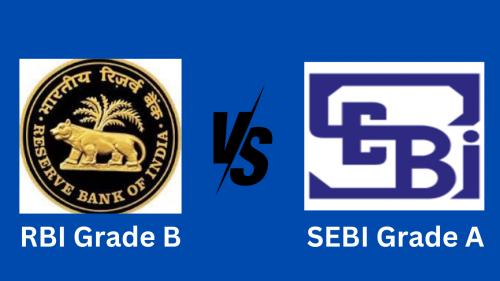Which is better SEBI grade A or RBI grade B?

In the realm of competitive examinations for lucrative government jobs in India, two names stand out prominently: SEBI Grade A and RBI Grade B. These prestigious exams attract thousands of aspirants every year, each vying for a coveted position in these esteemed regulatory bodies. However, the question often arises: which one is better? In this article, we will delve into the details of both exams, comparing their intricacies, roles, and career prospects to help aspirants make an informed decision.
Understanding SEBI Grade A and RBI Grade B Exams
SEBI Grade A:
The Securities and Exchange Board of India (SEBI) is the regulatory body for the securities market in India. SEBI Grade A exam is conducted to recruit officers in various streams like General, Legal, Information Technology, Engineering, Research, and Official Language. It is a highly competitive exam that assesses candidates on their knowledge of financial markets, securities laws, and general awareness.
RBI Grade B:
The Reserve Bank of India (RBI) is the central bank of India responsible for the monetary policy of the country. The RBI Grade B exam is conducted to recruit officers in various departments such as General, DEPR (Department of Economic and Policy Research), and DSIM (Department of Statistics and Information Management). The exam evaluates candidates on their understanding of economics, finance, banking, and current affairs.
Exam Structure and Syllabus:
SEBI Grade A:
The SEBI Grade A Syllabus consists of three phases: Phase 1, Phase 2, and an Interview. Let's delve into each phase:
Phase 1:
Phase 1 is an online examination comprising multiple-choice questions.
It includes subjects like General Awareness, English Language, Quantitative Aptitude, Reasoning Ability, and Awareness of Securities Market.
Phase 2:
Phase 2 consists of two papers: Paper 1 and Paper 2.
Paper 1 tests candidates on subjects like Financial Markets, Securities Laws, Reasoning, English Language, and General Awareness.
Paper 2 assesses candidates on their proficiency in subjects related to their specific stream.
Interview:
Candidates who qualify Phase 2 are called for an interview where their knowledge, skills, and suitability for the job are evaluated.
RBI Grade B:
Similar to SEBI Grade A, the RBI Grade B exam also consists of three phases: Phase 1, Phase 2, and an Interview.
Phase 1:
Phase 1 is an online examination comprising multiple-choice questions.
It includes sections like General Awareness, English Language, Quantitative Aptitude, and Reasoning Ability.
Phase 2:
Phase 2 consists of three papers: Paper 1, Paper 2, and Paper 3.
Paper 1 includes subjects like Economic and Social Issues, English (Writing Skills), and Finance and Management.
Paper 2 and Paper 3 evaluate candidates on subjects related to the specific department they have applied for (DEPR or DSIM).
Interview:
Candidates who clear Phase 2 are called for an interview round.
Comparison:
1. Job Profile and Responsibilities:
SEBI Grade A: Officers in SEBI are responsible for regulating the securities market, ensuring compliance with laws, and protecting the interests of investors.
RBI Grade B: Officers in RBI are involved in formulating and implementing monetary policy, regulating banks, managing foreign exchange reserves, and overseeing the financial system's stability.
2. Work Environment:
Both SEBI and RBI offer a professional work environment with opportunities for learning and growth. SEBI primarily focuses on securities market regulation, while RBI's role is broader, encompassing monetary policy and banking regulation.
3. Career Progression:
Both SEBI Grade A and RBI Grade B offer excellent career progression opportunities. Employees can rise through the ranks and take up leadership positions within their respective organizations.
4. Compensation and Benefits:
Compensation packages in both SEBI and RBI are competitive, with attractive salary structures, allowances, and benefits.
5. Work-Life Balance:
While both SEBI and RBI demand dedication and hard work, they also offer a decent work-life balance compared to many other government jobs.
Conclusion:
In conclusion, both SEBI Grade A and RBI Grade B exams offer promising career opportunities in the financial sector. The choice between the two depends on one's interests, career goals, and aptitude for the specific roles and responsibilities associated with each organization. Aspirants should carefully assess the exam syllabus, job profiles, and growth prospects before making a decision. Regardless of the choice, diligent preparation, perseverance, and dedication are key to success in these competitive exams.
Advertise on APSense
This advertising space is available.
Post Your Ad Here
Post Your Ad Here
Comments